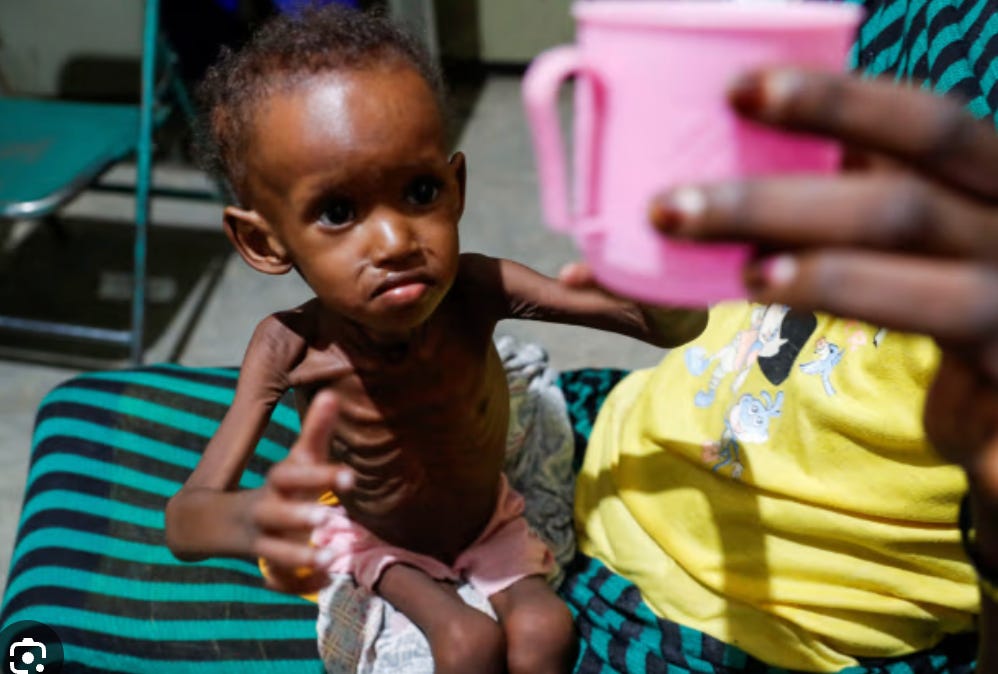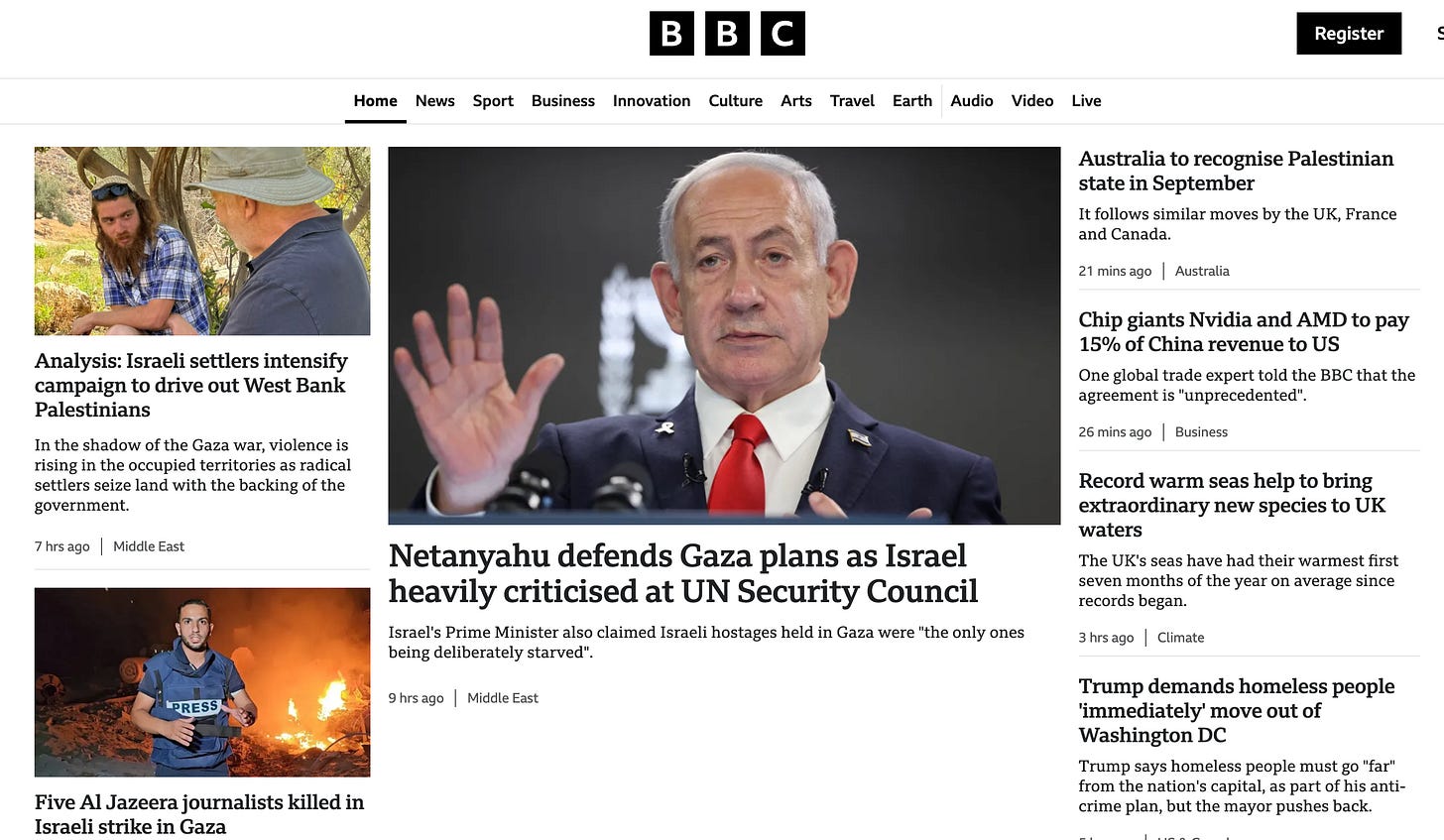WHAT THIS CONFLICT IS ABOUT
305 MILLION PEOPLE FACE HUMANITARIAN DISASTER. TWO MILLION OF THEM LIVE IN GAZA.
About two million people live in Gaza and, as you know from the news, most of them are facing humanitarian disaster.
What you may not know is that, worldwide, it is estimated that 305 million people face immediate humanitarian crises. Maybe you missed that story buried deep on your news feed.
On Sunday night, in a routine whip-round of the news, I clicked on the BBC. Here’s what I saw:
Of the seven top stories on the site, four were about Israel and Palestine, including the in-your-face mug of Israel’s universally beloved prime minister above a headline declaring that the (ahem) world’s parliament condemns his war strategy.
I’m not going to address whether the editorial approach of each of the stories was fair or balanced. The volume of the coverage, given the plethora of news in the world, is indicative of something absolutely out of whack.
This was not the BBC’s Middle East page. It was not an algorithmically determined selection of stories based on the fact that the BBC knows I am as obsessed as they are with this topic.
This is what everyone landing on their page Sunday night (or, I guess, Monday morning, in the UK) saw. (Gazans are dying. Have a nice week.)
This is by no means an outlier. The compulsive fixation on this one conflict, this one region, this one topic when 150 times as many people in the world face similar or worse catastrophes is typical — not just on news channels, but in NGOs, the entire diplomatic world, among activists, dinner table conversations and gawdknows social media. You would think we lived on a planet of heavenly bliss were it not for that one, solitary blight, that infernal conflict between Israelis and Palestinians.
It is a moral (to say nothing of a journalistic) atrocity.
In Sudan alone, 30 million people are in dire need of assistance, with 12 million displaced.
And spare me the allegations of “whataboutery.”
Is the conflict in Gaza serious and tragic? Of course. But so are the calamities facing 150 times as many people worldwide. And where the hell are their stories on the BBC website? Where are their voices at the UN? Why aren’t the governments of the UK, France and Canada issuing ultimatums against the parties in those conflicts and disasters? Where are the millions marching in the streets about the right of those people to live?
There are answers. Let’s start with the generous one.
The world is laser-focused on this conflict, to the detriment of every other issue, conflict and cause on the planet, because we think we understand it.
The world is an amorphous blob to most Western people.
Is it Uruguay or Paraguay that’s landlocked?
Gambia, Guinea, Senegal? Try putting them in the right place on a map.
We call five central Asian countries “The Stans” — even though they are larger than Western Europe and have a population greater than Germany — because we can’t differentiate them.
Guyana, Suriname, French Guiana. What order do they go in? Latvia, Lithuania, Estonia? Anyone?
But the Holy Land? Oh, we know that one.
We know it from Christmas songs. Pop culture. Sunday school. Charlton Heston at Easter.
We also know it because media, for decades, have ensured that we know it. There are legit reasons for this, but one of the reasons is less so.
Journalists like being posted to Jerusalem. It’s a plum.
Sudan, not so much.
The area is the cradle of world religions adhered to by more than half the planet’s population. So there is going to be a, let’s say, sentimental attachment to the area, isn’t there?
Whatever the journalistic or theological motivations, here is where that “knowledge” becomes a problem.
We assume we know more than we do.
Our “understanding” of the issues there is based less on the facts of the conflict or the history of the region than on what we know — or think we know — about the parties involved.
Actually, we don’t know much — or in some cases anything — about Palestinians. (Simplest evidence: Much of the world has subscribed to a narrative in which the people who came later are the indigenous people and the people who were there first are the “colonial-imperialist” usurpers. So millions of people are a bit fuzzy on the main concepts.)
But here is one thing that is absolutely clear: Anyone who grew up in a Christian or Muslim society, however unobservant they may be, absorbed all sorts of assumptions, biases, ideas, tropes and ideas about the other party in this conflict.
Jews.
There is a reason why both Palestinians and Israelis, in the narrative, often come across less as actualized human beings than as avatars in a simplified narrative.
This is practically the birthplace of metaphor.
Surely I don’t need to go into great detail about the myriad roles Jews play in the metaphors of Christian and Muslim societies. And if you think that is anything other than absolutely foundational to why this conflict drives fanatical preoccupation in a world typified by short attention spans, then you really do adhere to the supernatural.
So there are “good reasons” for focusing on this issue while hundreds of millions of non-Gazans face starvation and death unnoticed and unmourned.
But these “good reasons” are not just excuses. They are themselves symptoms of a social disorder. They are a self-fulfilling prophecy that drives a cycle of fanatical anti-Israel activism.
The narrative we hear about this conflict adheres less to the facts of current events than to the tropes of the past two millennia.
The Jewish state is engaged in a defensive war in which, according to experts in the field, a smaller proportion of civilians are dying than in comparable conflicts. But the Jews of Israel are accused of deliberate mass murder, of infanticide, of the worst atrocities known to humankind. Not because that is what’s happening, but because that’s what our culture tells us those people do.
A faked photo of a “starving” Palestinian kid is plastered across the front page of the English language’s most trusted news source and the world feasts on the outrage. There is no shortage of food in Gaza, we know. But the “government” of the enclave is stealing it and keeping it from the citizenry. And how does the world respond? The way the world has responded for thousands of years.
Blame the Jews.
The global “humanitarian” concern evoked by the crisis in Gaza is not a response to the facts on the ground. It does not address why food is not reaching mouths. It ignores the root causes of the conflict and blames the victims rather than the perpetrators. It is a continuation of centuries of cultural programming in which at least half the world is prepared to believe the worst about one side in this conflict.
If any of this depravity actually had any positive impact on Palestinians, we might be able to make excuses for it.
But none of this helps “free Palestine” or stops Palestinians from dying. On the contrary, the fanatical misplacing of blame and the obfuscation of the drivers of this conflict only perpetuate the conflict and ensure more Palestinians die. That is the impact of the “pro-Palestinian” movement.
And this impact of Palestinian death and destruction is not a coincidence. It is a deliberate strategy of the movement. The more Palestinian die, the more successful the global vilification of Israel.
That is what this is about.
*
Some people have generously asked me to make it possible to make one-time contributions to support my work. I have now set up a PayPal link for donations. If you like snappy smackdowns of antisemitism and anti-Zionism and want me to keep it up, any support is deeply appreciated. Click here.




Hey Pat, I've been enjoying your work for a while. Last night I was catching up on the episodes of John Oliver that I missed while I was keeping people safe at festivals and I had to sit through his recent rant on Gaza. 🙄
If you'd be so kind as to read my very first post on here about what I encountered at one of those festivals you sure might find it interesting.
https://open.substack.com/pub/extropyshaman/p/what-ifantisemitism-wins?utm_source=share&utm_medium=android&r=29au4j
Another great post, Pat! Whenever I point out the hypocrisy behind ignoring the hundreds of millions of actually starving and dying humans on earth, I get responses such as, “well that’s because they’re African and no one cares about Africans”, to which I always want to reply, “what, so Gazans are white now?” I was disappointed to read even Bono (an artist I have followed with great affection for over 40 years) point out some of the numbers similar to those you give, then say there is no hierarchy to suffering (a handy way to excuse the disproportionate attention to Gaza), immediately followed by “But…but…but” - as further proof that somehow this conflict is STILL worse than all others! Israel IS the “whataboutism” used to deflect attention away from all others. Gaza has now become everyone’s pet care, which is as useful to Gazans, let alone Israelis, as (to quote a friend) “t!ts on a bull.”